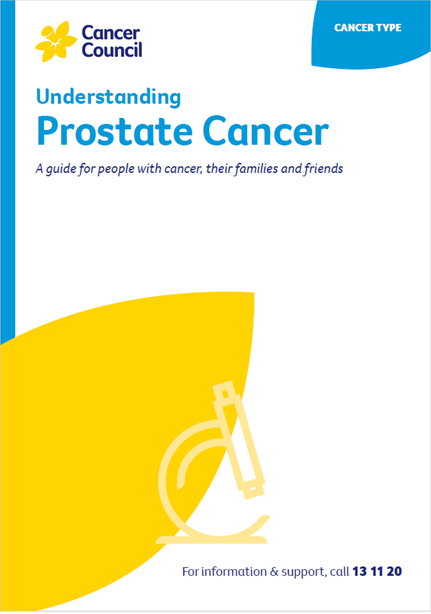- Home
- Prostate cancer
- Management and treatment
- Androgen deprivation therapy (ADT)
Androgen deprivation therapy (ADT)
Prostate cancer needs testosterone to grow. Reducing how much testosterone your body makes may slow the cancer’s growth or shrink the cancer temporarily. Testosterone is an androgen (male sex hormone made by the testicles), so this treatment is called androgen deprivation therapy (ADT). It is also known as hormone therapy.
ADT for locally advanced cancer may be used after a radical prostatectomy or with radiation therapy. It may also be given to help control advanced prostate cancer.
There are different types of ADT that may be used.
Learn more about:
- ADT injections
- Intermittent ADT
- Anti-androgen tablets
- Removing the testicle (orchidectomy)
- Side effects of ADT
ADT injections
The most common form of ADT involves injecting a drug to block the production of testosterone. Your GP or specialist can give the injections. How often you have injections depends on the type of ADT. They may be given monthly, every 3 months or every 6 months. ADT injections can help slow the cancer’s growth for years.
ADT injections may also be used before, during and after radiation therapy to increase the chance of getting rid of the cancer. They are sometimes combined with chemotherapy.
Intermittent ADT
Occasionally ADT injections are given in cycles and continue until your PSA level is low. Injections can be restarted if your PSA rises again. This is known as intermittent ADT. In some cases, this can reduce side effects. It is not suitable for everyone.
Anti-androgen tablets
Often called hormone tablets, anti-androgen tablets may be given in combination with ADT injections.
Removing the testicle (orchidectomy)
This surgery is an uncommon way to lower how much testosterone your body makes.
If you have advanced prostate cancer, you may choose to have surgery rather than regular ADT injections or tablets.
Surgery to remove both testicles is called a bilateral orchidectomy. It is possible to have a silicone prosthesis put into the scrotum to keep its shape. Removing only the inner part of the testicles (subcapsular orchidectomy) also lowers testosterone and does not need a prosthesis.
Side effects of ADT
ADT may cause side effects because of the lower levels of testosterone in the body.
Side effects may include:
- tiredness that doesn’t go away with rest (fatigue)
- reduced sex drive (low libido)
- difficulty getting an erection (impotence)
- shrinking of the testicles and penis
- loss of muscle strength
- hot flushes and sweating
- weight gain, especially around the middle
- breast swelling and tenderness
- mood swings, depression, trouble with thinking and memory
- loss of bone density (osteoporosis) – calcium and vitamin D supplements and regular exercise help reduce the risk of osteoporosis
- higher risk of diabetes, high cholesterol and heart disease – more likely the longer you have ADT. Ask your doctor about these risks.
Adjusting to changes in your testosterone levels takes time. For ways to manage side effects, talk to your treatment team or see Managing side effects.
To find out more about ADT, visit the Prostate Cancer Foundation of Australia or call 1800 22 00 99. For information about erectile and other sexual health issues, visit healthymale.org.au.
→ READ MORE: Managing side effects of prostate cancer
Podcast: Making Treatment Decisions
Listen to more episodes from our podcast for people affected by cancer
More resources
Prof Declan Murphy, Consultant Urologist, Director – Genitourinary Oncology, Peter MacCallum Cancer Centre and The University of Melbourne, VIC; Alan Barlee, Consumer; Dr Patrick Bowden, Radiation Oncologist, Epworth Hospital, Richmond, VIC; Bob Carnaby, Consumer; Dr Megan Crumbaker, Medical Oncologist, St Vincent’s Hospital Sydney, NSW; Henry McGregor, Health Physiotherapist, Adelaide Men’s Health Physio, SA; Jessica Medd, Senior Clinical Psychologist, Department of Urology, Concord Repatriation General Hospital and Headway Health, NSW; Dr Gary Morrison, Shine a Light (LGBTQIA+ Cancer Support Group); Caitriona Nienaber, 13 11 20 Consultant, Cancer Council WA; Graham Rees, Consumer; Kerry Santoro, Prostate Cancer Specialist Nurse Consultant, Southern Adelaide Local Health Network, SA; Prof Phillip Stricker, Chairman, Department of Urology, St Vincent’s Private Hospital, NSW; Dr Sylvia van Dyk, Brachytherapy Lead, Peter MacCallum Cancer Centre, VIC.
View the Cancer Council NSW editorial policy.
View all publications or call 13 11 20 for free printed copies.

